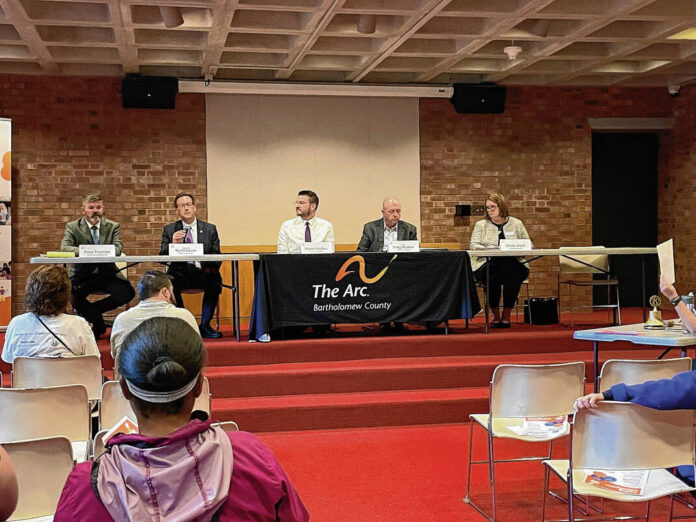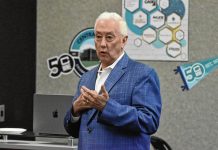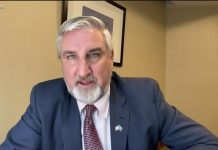
Photo provided Candidates at the forum Wednesday night were, from left, state representative Democratic candidate Ross Thomas; Rep. Ryan Lauer, R- Columbus; Democratic state senate candidate Bryan Munoz; Sen. Greg Walker, R- Columbus; Sixth District congressional candidate Democrat Cinde Wirth. Incumbent Rep. Greg Pence, R-Columbus, did not attend.
In a forum of state and federal candidates, Democratic candidate Cinde Wirth of Columbus said that if elected to Congress, she would work to codify Roe v. Wade, ensuring a federal right to abortion, and that there was no place for government in that decision-making process.
Wirth was among five candidates for state and federal legislative offices who fielded questions about disability, education, social justice and community issues Wednesday evening in the Red Room of Bartholomew County Public Library.
Panelists were Ryan Lauer, R-Columbus, state representative for House District 59, and his challenger, Democrat Ross Thomas; District 41 Sen. Greg Walker R-Columbus, and his Democratic opponent, Bryan Munoz, and Wirth. Sixth District Rep. Greg Pence, R-Columbus, whom Wirth is challenging, was invited but did not attend the candidates forum.
Questions about abortion, which was outlawed with narrow exceptions by an Indiana law passed this summer but blocked this month by a judge, arose during the candidate forum hosted by The Arc of Bartholomew County and Self Advocates of Tomorrow. Both organizations are focused on ensuring the rights of the intellectually and developmentally disabled.
In response to a question about a scenario in which a disabled adult experienced birth control failure, and what role government ought to play in child support, Thomas said “real life is not an abstraction” and that government ought to provide as much support as possible. Lauer mentioned Senate Bill 2, which he said significantly increases adoption tax credits.
Munoz said that a person with mental disabilities might not know when she was pregnant before the Indiana’s new abortion law requires decisions about carrying the child to term would need to be made.
Walker, who voted for Indiana’s new abortion law, said that he had voted for 20 weeks for pregnancy termination in certain situations involving those in distress.
Candidates also discussed the 20/80 ratio of state to federal funding for vocational rehabilitation. Wirth mentioned the vocational rehabilitation center in Muncie and expressed support for using federal funds to expand that training beyond one location.
Lauer said he supports House Bill 1242, which encourages the state to procure products from businesses employing those with disabilities. Thomas noted the state’s $6 billion surplus as well as a vocational-rehabilitation waiting list.
Regarding certain situations such as sheltered workshops, in which employers can pay a subminimum wage, Thomas said they need to be paying minimum wage. Lauer said the legislature “absolutely” needs to “take a look at what we can do.” Munoz note that the unemployment rate for disabled individuals is 9 percent, and he called the $2.71 per hour subminimum wage “shameful.”
Ensuring that the votes of those with disabilities are counted was also discussed. Thomas said the first step is ensuring voters that elections have integrity. Lauer pointed out that Indiana has nearly a month of early voting and that assistance is available to voters. Munoz expressed concern that traveling boards — bipartisan teams that come to a voter’s house — can jeopardize ballot privacy. Walker, who has served on the state Senate’s elections committee for four years, said he filed an amendment to remove language from a bill that would have required people to explain why they can’t vote in person.
Wirth described herself as an advocate of statewide voter registration.
When the subject turned to Indiana’s Education Scholarship Account program, which connects students with disabilities to the most suitable educational environment, Lauer called ESAs a “transformation of opportunity” for such students. He said that ESAs provide funding for tuition and services such as therapy and transportation. Thomas expressed concern about oversight and the fact that funding comes through the Treasury Department rather than the Department of Education and the effect of that on due process.
Munoz supports the funding going to public education. Walker said that ESA providers are audited but he wants to see the program remain limited.
In response to a question about funding the Individuals With Disabilities Education Act, a nearly 50-year-old federal law, Wirth said that students’ federal right to education is undermined at the state level by ESAs.
Addressing the shortage of special education teachers, Walker explained that the funding formula for hiring them consists of current salary allocation plus the previous year’s inflation rate, which he said is being shown to not be useful at present. He hopes the upcoming budget cycle gives the legislature a chance to change the formula.
Munoz noted that even with an increase in teacher pay, Indiana is still below where it was 10 years ago. He supports opening up funding so money is not so strictly allocated, so that there is more flexibility in how its used.
On the question of how the state might address the needs of the disabled for transportation, Walker stressed that public transportation policy is decided at the county level. Munoz said that the state needs to empower counties to address the challenges of rural residents. Lauer said he “would love to hear from the self-advocates.” Thomas said he supported a state-funded regional, rather than county-by-county, approach.
All state-level candidates expressed support for expanding telehelp health care services for the disabled.
Regarding legislative oversight of how the executive branch spends allocated funds, Wirth wished to see close ties with stakeholder groups. Walker said that when possible he engages agencies about spending, but cautioned that legislators are “not traffic cops.” Lauer said he has experience solving problems behind the scenes when constituents are not getting answers from agencies. Thomas said that the trend in Indiana toward “privatizing everything” was cause for concern, and that oversight was needed.
Candidates were asked about the managed-care model for group homes. Thomas said that a single model doesn’t necessarily work for everyone, and that the goal should be to “understand people where they live.” Lauer said that as a family and children committee member, he works on how homes are reimbursed, and also said service providers are struggling to get and retain employees. Walker spoke of how the spirit of innovation seen in pilot programs doesn’t always continue once the programs become established.
Each candidate was given the opportunity for a concluding summation. Wirth said putting people first was her entire platform and that her aim is “not sacrificing human dignity for cost effectiveness.” Walker said he had filed a bill to get mentally incompetent people out of the court system. Munoz said the legislature should see itself in the role of serving citizens. Lauer stressed the role of the budget in getting self-advocates needed resources. Thomas noted points of agreement among the panelists, saying “just about anybody can find common ground if they work on it.”




